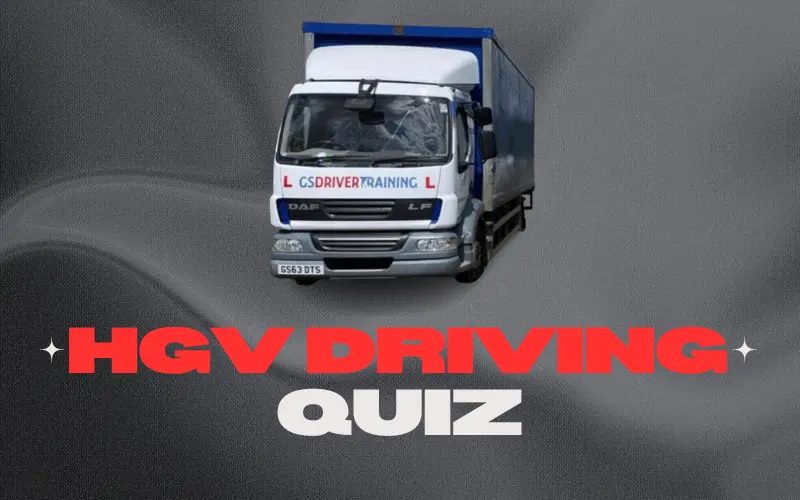Here’s a multiple-choice quiz focused on HGV (Heavy Goods Vehicle) driving, covering a range of topics from regulations to safety procedures. This quiz could serve as a helpful tool for aspiring HGV drivers to test their knowledge.
Minimum Age Requirement for HGV Licence in the UK
A) 16 years old
B) 18 years old
C) 21 years old
D) 25 years old
2. Before starting a journey, what is one of the key checks an HGV driver must perform on their vehicle?
A) Check the paintwork for scratches
B) Ensure all personal items are stowed away
C) Verify the vehicle’s load is secure
D) Make sure the radio is working
3. What does the acronym CPC stand for in relation to HGV driving?
A) Comprehensive Professional Conduct
B) Certificate of Professional Competence
C) Certified Provisional Capacity
D) Centralized Procurement Command
4. Which of the following categories allows you to drive a vehicle over 3.5 tonnes but not exceeding 7.5 tonnes, possibly with a trailer up to 750kg?
A) Category A
B) Category B
C) Category C1
D) Category D
5. What is the main purpose of the Hazard Perception Test in the HGV licensing process?
A) To assess your ability to repair the vehicle in case of breakdown
B) To evaluate your reaction to hazards on the road
C) To test your knowledge of vehicle parts
D) To verify your ability to drive at high speeds
6. How many hours of periodic training must HGV drivers complete every five years to keep their CPC valid?
A) 15 hours
B) 25 hours
C) 35 hours
D) 45 hours
7. What is the legal alcohol limit for drivers in England, Wales, and Northern Ireland (in microgrammes per 100 millilitres of breath)?
A) 35µg
B) 50µg
C) 80µg
D) 95µg
8. If you’re driving an HGV in the UK, what is the maximum speed limit on a dual carriageway?
A) 50 mph
B) 60 mph
C) 70 mph
D) 80 mph
9. Which of the following is NOT considered a part of the HGV driver’s daily walk-around check?
A) Tire condition and pressure
B) Engine oil level
C) Fuel efficiency rating
D) Brake performance
10. What should you do if you start to feel tired while driving an HGV?
A) Open the window for fresh air
B) Increase the volume of the radio
C) Stop and take a rest
D) Drink caffeinated beverages
Answers
1. B) 18 years old
2. C) Verify the vehicle’s load is secure
3. B) Certificate of Professional Competence
4. C) Category C1
5. B) To evaluate your reaction to hazards on the road
6. C) 35 hours
7. A) 35µg
8. B) 60 mph
9. C) Fuel efficiency rating
10. C) Stop and take a rest
This quiz offers a starting point for those preparing for their HGV license test, providing an overview of the kind of knowledge required for the role. Always consult the latest regulations and materials provided by your training provider or the relevant authorities to ensure you have the most up-to-date and comprehensive understanding.
HGV Theory Exam Quiz
1. What is the primary purpose of an HGV’s tachograph?
A) To control the vehicle’s speed
B) To record the driver’s driving hours and rest periods
C) To navigate the vehicle
D) To monitor the vehicle’s fuel consumption
2. When should you use hazard warning lights on an HGV?
A) When parked for loading and unloading on a double yellow line
B) When broken down and causing an obstruction
C) As a thank you gesture to other drivers
D) Constantly in foggy conditions
3. What is the maximum weekly driving limit for an HGV driver in the EU?
A) 45 hours
B) 56 hours
C) 90 hours
D) 60 hours
4. How close to a junction should you avoid parking?
A) 10 metres
B) 15 metres
C) 20 metres
D) 30 metres
5. What does a circular traffic sign with a blue background signify?
A) Mandatory instruction
B) Prohibited action
C) Warning
D) Information
6. What should you do if you start to feel tired while driving an HGV?
A) Open the window for fresh air
B) Continue to your destination
C) Stop and take a rest
D) Drink a caffeinated beverage
7. What is the legal minimum tread depth for tyres on an HGV in the UK?
A) 1.0 mm
B) 1.6 mm
C) 2.0 mm
D) 3.0 mm
8. How often should you check the security of your load?
A) Only before starting your journey
B) At regular intervals during the journey
C) Once a day
D) Only after an emergency stop
9. What should you do when approaching a roundabout?
A) Accelerate to merge smoothly with the traffic
B) Signal left regardless of which exit you are taking
C) Give right of way to traffic from the right
D) Stop completely before entering the roundabout
10. An anti-lock braking system (ABS) is designed to help drivers:
A) Increase their vehicle’s stopping distance
B) Maintain steering control under heavy braking
C) Reduce the vehicle’s fuel consumption
D) Enable shorter braking distances in all conditions
Answers:
1. B) To record the driver’s driving hours and rest periods
2. B) When broken down and causing an obstruction
3. B) 56 hours
4. A) 10 metres
5. A) Mandatory instruction
6. C) Stop and take a rest
7. A) 1 mm
8. B) At regular intervals during the journey
9. C) Give right of way to traffic from the right
10. B) Maintain steering control under heavy braking
This quiz is designed to test your knowledge and help you prepare for your HGV theory exam. Remember, understanding and memorizing the information is crucial for passing the exam. Good luck!
Also Read: Heading Down the Road to Becoming an HGV Driver with GS Driver Training








